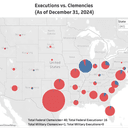
On August 9th, with the use of his executive authority, Governor John Bel Edwards (pictured) asked the Board of Pardons and Committee on Parole to return the 56 clemency applications filed by death-sentenced prisoners in Louisiana to its docket for consideration and set them for hearings. The Board of Pardons will now have until January 2024, when Gov. Edwards officially leaves office, to decide whether to recommend clemency for nearly all of the state’s death row prisoners. Earlier this year, Gov. Edwards expressed his opposition to capital punishment, stating that “the death penalty is so final. When you make a mistake, you can’t get it back. And we know that mistakes have been made in sentencing people to death.” Gov. Edwards, who has the authority to sign off on clemency requests, asked the board to consider the applications despite Attorney General Jeff Landry’s advisory opinion that none of the individuals are eligible for clemency. AG Landry, who is running to replace Gov. Edwards, has argued that the clemency applications are untimely.
In his letter to the Board, Gov. Edwards emphasizes that any prisoner who receives clemency would receive a life without parole sentence and would never be released, absent a finding of factual innocence. He writes that while he has the Constitutional authority to issue temporary reprieves and stays of execution, a commutation requires a Board recommendation. With respect to AG Landry’s advisory opinion, Gov. Edwards writes that “to read the rules to prohibit a capital applicant from asking the Board for clemency at any time outside of the one-year window after a direct appeal denial is misguided and yields a result that is both absurd and illogical. The rule, as written, simply does not prevent the Board’s consideration of these applications at this time.”
Governor Edwards also reiterates his opposition to the death penalty. He notes that “we must consider further the imperfect nature of the criminal justice system and the actual innocence that has been proven far too often after imposition of the death penalty.” Since 1999, nine people have been exonerated from death row in Louisiana, six of whom are people of color. Many of the individuals applying for clemency have cited the mistakes, racial disparities, and other longstanding systemic problems with the fair administration of the death penalty in Louisiana. Data from the Louisiana Capital Appeals Project indicate that 74% of those on Louisiana’s death row are people of color, and 67% are Black. The data also show that many people of color were sentenced to death by all-white juries. Gov. Edwards reminds the Board that “it is important to note, the question is not whether these individuals should be set free, but whether a state-sanctioned execution meets the values of our pro-life state. All of these reasons were enough for [him] to support legislation to end the death penalty in Louisiana. While that effort failed in the Legislature, the Louisiana Constitution gives [him] as Governor and this Board the authority and the duty to consider these applications for individuals already sentenced to death. We should not shrink that obligation.”
Louisiana has carried out just one execution in the last 20 years. In January 2010, Gerald Bordelon was executed after he waived his appeals. Currently, a shortage of lethal injection drugs has prevented the scheduling of any executions.
James Finn, After years of silence, John Bel Edwards says he opposes the death penalty, NOLA, March 24, 2023; Lester Duhé, AG Jeff Landry urges Pardon Board to follow rules while considering death row clemency pleas, WAFB, July 19, 2023; Tyler Bridges, John Bel Edwards tells board to consider clemency cases in push to empty death row, NOLA, August 9, 2023; Press Release, BREAKING: 51 Louisiana Death Row Prisoners File Clemency Petitions, June 13, 2023.
See Governor Edwards’ letter, here.
Image Credit: Richard David Ramsey, CC BY-SA 3.0 <https://creativecommons.org/licenses/by-sa/3.0>, via Wikimedia Commons



